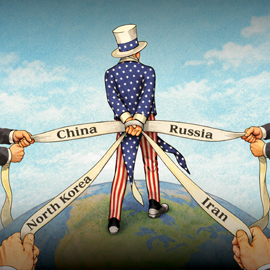News
Boost the US Bomber Force: Dollars vs. Operational Needs
The United States Air Force should consider shifting its balance of its strike forces from fighters to long-range bombers.
Cheney Was Right: The Sorry History of Our North Korean Policy
Since Donald Trump took office, the growth of North Korea’s nuclear arsenal and the increasing capability and diversity of its ballistic missile force have made that country the most urgent threat to U.S. national security.
America’s New World Order Is Now Officially Dead
American foreign policy has reached a historic inflection point, and here’s the surprise: It has very little to do with the all-consuming presidency and controversies of Donald Trump. For roughly 25 years after the Cold War, one of the dominant themes of US policy was the effort to globalise the liberal international order that had initially taken hold in the West after World War II. Washington hoped to accomplish this by integrating the system’s potential challengers — namely Russia and China — so deeply into it that they would no longer have any desire to disrupt it. The goal was, by means of economic and diplomatic inducement, to bring all the world’s major powers into a system in which they would be satisfied — and yet the US and its values would still reign supreme.
The Five Lessons That Must Guide U.S. Interactions with Vladimir Putin
U.S.-Russian relations are worse today than at any time since the end of the Cold War — worse, indeed, than at any time since the dangerous years of the early 1980s. Crises and confrontations have become more the norm than the exception in recent years; the rhetoric in Washington and Moscow alike has become increasingly hostile.
Why Beating Islamic State Could Start a Crisis with Iran
The U.S. is rapidly heading down the path of confrontation with a rogue-state adversary, a potential foe that has proved rational yet ruthless in pursuit of its interests, including the aggressive development of its nuclear program and associated military capabilities. The rogue state this description best fits, however, may not be North Korea, but Iran.
Analysis of the FY 2018 Defense Budget – Procurement
Although increased capacity and lethality are the second priority of the Pentagon’s PB 2018 budget request behind restoring the readiness of the current force, funding for procurement increases far less than for RDT&E and operation and maintenance accounts (O&M) in real terms.[

























